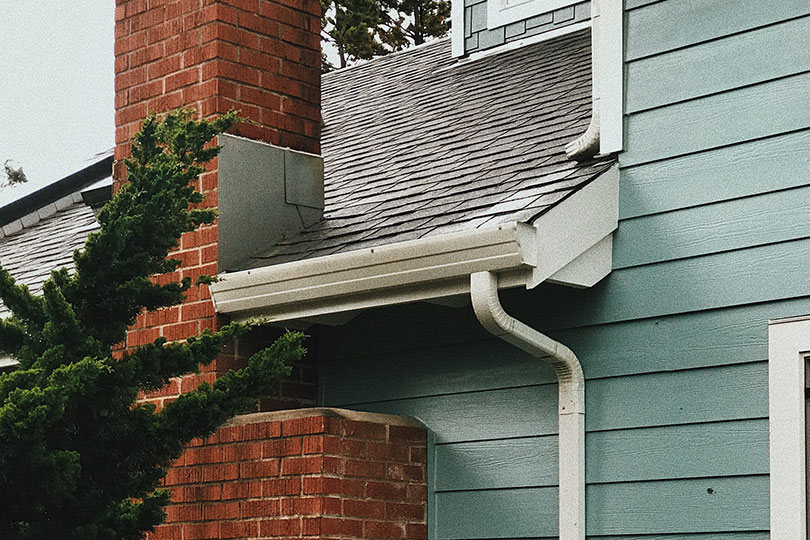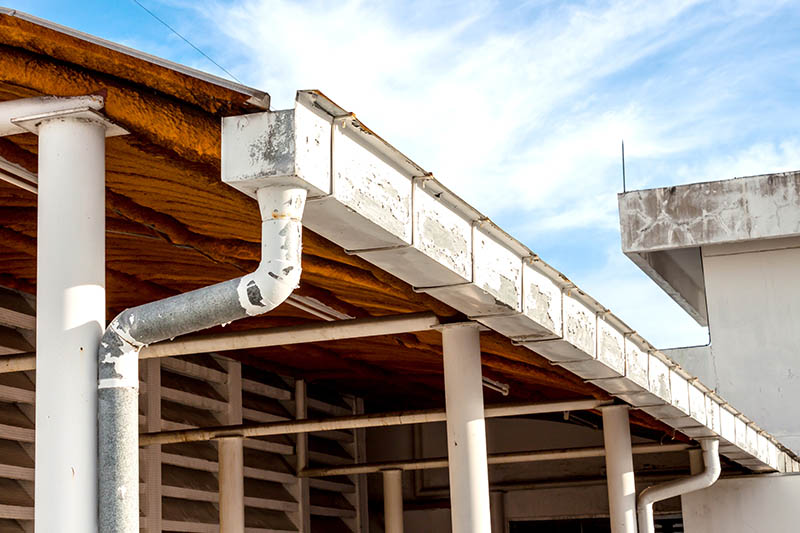How to Clean a Gutter Downspout: 5 Easy Steps
-
Pete Ortiz
- Last updated:

One way of extending the life of gutters and downspouts is to keep them clean. As leaves fall on the roof, they move into the gutter and clog the downspout, thus preventing it from draining water efficiently. That’s why you need to regularly remove leaves, sticks, and other debris before they cause leaks and water damage.
Understanding a surefire way of removing debris from downspouts is essential. If you aren’t well-versed in the cleaning process, don’t fret because this article provides easy, step-by-step guidelines.
Get Ready First
The most ideal time to clean your gutter and unclog the downspout is a few days after a heavy rain. This is the perfect time because there’s the most debris caught from leaves. However, before doing the actual cleaning, there are a couple of things to put in place first.
- Gather all the supplies you will need, including a leaf scooper or trowel, a garbage bag, a garden hose, and an extension ladder.
- Dress for the job. Considering that unclogging a downspout is a dirty job, you should wear long pants, long sleeves, and gloves to protect your body.
- Find a second person to hold the ladder firmly as you remove debris.
How to Go Clean Downspouts
1. Set the Ladder
Your extension ladder should be tall enough to reach the top of the gutters. Ensure the slanting angle isn’t too steep while setting it up. For every 4 feet of vertical height, you are required to move the ladder’s bottom 1 foot away from the house. For example, you can place the ladder 4 feet away from the base of the building if the gutter top is 16 feet high. Also, you should avoid climbing the roof if possible—clean from the ladder only.

2. Remove Leaves Around the Downspout Opening
With your gloves on, push all the debris away from the top of the downspout, scoop them using a trowel, and throw them into a bucket. You can either suspend the disposal bucket on the ladder or place it on the ground.
Also, pull out any leaves stuck in the downspout hole. This step may require you to readjust your ladder and lean over since the dirt may be substantial. If your downspout has been fixed with a screen, your work will be easier because the screen covers the hole that could get clogged.
3. Check for Clogs by Hitting the Downspout
Using a tool handle or a spare piece of plywood, tap along the length of the downspout to detect clogs. It is recommended to start at the bottom and work your way up.
Strike forcefully on the downspout’s exterior until you notice a solid sound instead of a hollow ringing—that’s where your downspout is clogged. Hitting that spot repetitively should break the clogs apart, but don’t fret if they don’t because our next step addresses what to do in this scenario.

4. Blow Out Debris Using a Leaf Blower
If you have a leaf blower, attach it to the lower end of the downspout and switch it on. Allow it to run for a couple of minutes, then check whether the debris comes out through the top. If not, you should run it again for 1–2 minutes before confirming.
Most leaf blowers may not work if the debris is wet because it’s heavier and harder to push out. Nonetheless, you should run the blower at a time until the debris comes out or wait until it dries up. Do not use the blower from the downspout’s top or else the ladder might wobble and make you fall.
5. Rinse Out the Clog
Stubborn clogs will require you to spray water into the downspout to break them apart. Insert a high-pressure hose into the bottom and push it upwards until it can’t go any further. Switch it on and wiggle it around as the clog keeps breaking.
Furthermore, you should pull and push the hose occasionally to see if it can go any higher. Pull it out when the cleaning is done. You must note, however, that the clogs may not break if the water is flowing at low pressure. In that case, you’ll need to snake an auger into the downspout.
How to Unclog a Downspout Using a Drum Auger

1. Insert a Drum Auger into the Bottom of the Downspout
The metal end of a drum auger contains a ball or claw shape and lets you pull out of the cylindrical drum up to 2–3 feet. Insert the ball into the bottom of your downspout and shove it upwards.
If you don’t have a drum auger, you should check whether your local hardware store sells them. The alternative is to become creative and straighten out a wire hanger. But no matter the technique you opt for, do not feed the drum from the downspout’s top, as it will compact the debris.
2. Push the Line Until You Hit the Clog
Push the metal line emerging from the auger into the downspout while holding its base. While doing this, ensure you are wearing effective work cloves to avoid scratching or pinching your skin.
The metal line should hit the blockage after some time. Wiggle it and continue pushing to ensure it doesn’t get stuck at a bend. If the auger line isn’t long enough, consider unscrewing and removing the lower section of the downspout to reach the blockage.
3. Turn the Handle Clockwise While Pushing
Use your dominant hand to hold the handle on the back of the auger and the non-dominant one to grab the metal line’s base. Rotate the handle quickly and clockwise to spin the ball on the further end.
Simultaneously, push the line up and down to get it deeper into the clog. Do this until you can’t feel any more debris. Run some water to confirm whether you’ve removed all the clogs.
4. Rotate the Handle Counterclockwise While Pulling
If you are right-handed, you should slowly pull the line out of the gutter using your left hand. In the meantime, use your dominant hand to rotate the handle on the back of the auger in a clockwise direction to direct it back to the drum. Keep pulling until you can reach out for the ball. As you do, remove any debris that’s stuck around it before reeling it back into the drum.
5. Rinse the Downspout
Direct the hose pipe towards the roof and turn it on. Allow the water to run down the gutter for 1–2 minutes, depending on the water pressure.
Keep an eye on the bottom of the downspout to ensure the water drains freely and properly. If the water doesn’t drain well, you should snake the auger once more until all the clog is removed.
How Do You Prevent Gutter Dirt From Clogging the Downspout?

1. Clean Your Gutters Regularly
Clean your gutters in spring and fall because most trees shed their leaves during these seasons. It would be best if you start in the corners and work your way toward the center. The good thing is that you can hire professional service to help you if you can’t do it yourself.
2. Install Gutter Screens Around the Downspout Holes
It makes sense to trap loose debris before entering the hollow of a downspout. Fortunately, you only need a screen large enough to cover the hole at the top.
Using a ladder, reach for gutters and locate the downspout hole. Place the gutter screen inside the hole and push it down until only 2 inches are sticking up.
3. Install Gutter Covers
Gutter covers are the alternative to setting up gutter screens. They are even more effective. The following guidelines show how to set up gutter covers on your roof:
- Use a tape measure to determine the length of your gutter system. Purchase gutter covers of the same length from your local hardware.
- Position them atop your gutter system while leaving a half-inch opening between the edges.
- Pin the covers to the back walls using non-corrosive screws.
4. Trim Overhanging Tree Branches
Since tree leaves highly contribute to gutter debris, it would be wise to trim overhanging branches around the house. Use a tree saw to cut down branches from the base. Ensure you cover all the trees whose branches hang above the roof, but if they are too heavy or large, consider contacting professional services.
Find a gutter specialist in your area, and get free, no-commitment estimates for your project.Consult a gutter installation expert

Conclusion
As much as leaves are beautiful to behold, they can wreak havoc on your downspouts and potentially cause water damage. Unclogging debris from the downspout is an essential maintenance practice that’s not worth neglecting.
The cleaning process is simple and quick. Armed with work gloves, a garden hose, a trowel, and a ladder, you can do it yourself. Begin by setting up the ladder, removing the debris around the top of the downspout, and flushing out clogs using a leaf blower or a drum auger. You must also run some water through the downspout to ensure no debris remains stuck. Best of luck cleaning your gutters and downspouts!
Featured Image Credit: Zachary Keimig, Unsplash
Contents



